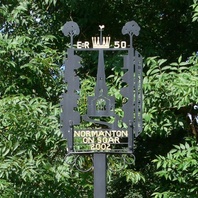
Viking Names
Normanton on Soar
Normanton on Soar, in the Rushcliffe Wapentake of Nottinghamshire, takes its name from the Old English ethnonym Norðman ‘Northman, Norwegian’ and the Old English element tun ‘farm, settlement’. There are several places of this name, predominantly in the East Midlands: five in Nottinghamshire, one each in Derbyshire, Leicestershire, Lincolnshire and Rutland, and one in the West Riding of Yorkshire. The affix Soar refers to the location of this Normanton on the River Soar. Traditionally, the place-name has been interpreted as referring to a settlement of Norwegians (in an area where most of the Scandinavian settlers were Danes). However, the exact implications of such a name are not yet fully understood and are the subject of ongoing work by Dr Jayne Carroll of the Institute for Name-Studies, University of Nottingham.
Read More
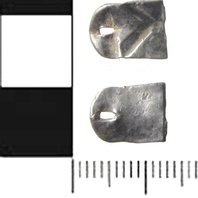
Viking Objects
Mystery Hacksilver
A fragment of silver from an unidentified object. The piece has been pierced at one end but may have come from an armring or other piece of jewellery. As hacksilver, it would have been used to pay for items by weight of silver.
Read More
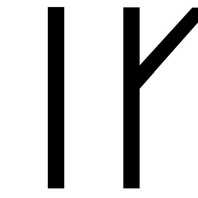
Viking Names
Bekki
The Old Norse postulated male name Bekki is possibly an Anglo-Scandinavian formation originally from Old Norse bekkr ‘brook’. However, it could also be related to Frisian Becke or Continental Germanic Becco. Another possible derivation is from Old English becca ‘mattock’. Bekki is believed to be the first element in the place-name Bigby, Lincolnshire.
Read More
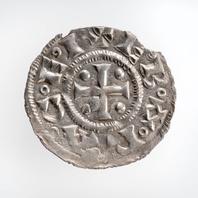
Viking Objects
Northumbrian Viking Penny (CM.952-2000)
This Sword St. Peter type silver penny is not associated with any particular ruler but was minted in the Viking kingdom of Northumbria. The coin features a sword image which is usually considered to represent the sword of St Peter, whose name features on the same side of the coin, and a hammer which is often taken to be Thor’s hammer, thus mixing the iconography of the Christian and Norse religions. It was found as part of the Thurcaston hoard which was probably buried c.923-925 CE, approximately five years after Leicester had been retaken by Mercia (c.918). The coins in the hoard are Anglo-Saxon, Arabic and Danelaw issues, showing the wide-ranging contacts between societies at this time. After the establishment of the Danelaw, some Viking leaders decided to mint their own coins to solidify their legitimacy in the eyes of the local populace. This created a hybrid economy where some members of the Danelaw used bullion and others used coins. The bullion economy resulted in some coins being cut into pieces to pay for items.
Read More
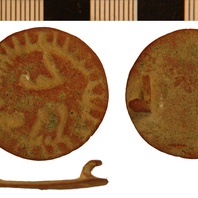
Viking Objects
Brooch with Backwards-Facing Beast (NLM-08BAEB)
It has been suggested that the beast motif on this brooch represents a horse, but identification is uncertain. This brooch was probably the property of an ordinary person rather than of a member of the social elite. It is of a fairly common type. For more information on Scandinavian jewellery in England check out our blog: Brooches, Pendants and Pins: Scandinavian Dress Accessories in England.
Read More
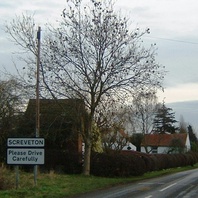
Viking Names
Screveton
Screveton, in the Bingham Wapentake of Nottinghamshire, is made up of two Old English elements, scir-gerefa ‘sheriff’ and tun ‘farm, settlement’. However, the modern pronunciation (as if ‘sk-‘) is due to the influence of Scandinavian-speakers. Old English words beginning in sc- (usually sh- in Modern English, like ‘ship’) often have Scandinavian equivalents spelled (and pronounced) sk- (like Old Norse skip and Modern Danish skib for the same thing). Many modern English words beginning in sk- derive from Old Norse.
Read More
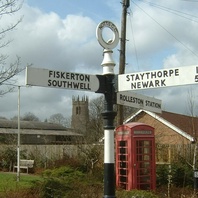
Viking Names
Fiskerton
Fiskerton, in the Thurgarton Wapentake of Nottinghamshire, is from the Old English elements fiscere ‘fisher’ and tun ‘farm, settlement’. The pronunciation has however been influenced by Scandinavian-speakers (compare Old Norse fiskari with the same meaning). There is also a Fiskerton in Lincolnshire, which has undergone the same process.
Read More

Viking Names
Riby
Riby, in the Yarborough Wapentake of Lincolnshire, was originally an Old English compound Rygetun ‘the farmstead or village where rye grows’. The Old English tun ‘farm, settlement’ was replaced by Old Norse by ‘farm, settlement’.
Read More
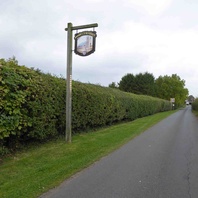
Viking Names
Fenby
Fenby, in the Haverstoe Wapentake of Lincolnshire, is an Anglo-Scandinavian hybrid from Old English fenn ‘a fen, a marsh, marshland’ and Old Norse by ‘a farmstead, a village’. It is most likely to be a partial Scandinavianization of an earlier Old English place-name, perhaps Fenton, with a similar meaning. Fenby is now a joint parish with Ashby, and the name survives in Fenby Farm, which lies in what must have been a fenny area on the lower slope of the Wolds.
Read More

Viking Names
Kirton
Kirton, in the Bassetlaw Wapentake of Nottinghamshire, is a hybrid name, a compound of Old Norse kirkja ‘a church’ and Old English tun ‘ an enclosure; a farmstead; a village; an estate’.
Read More
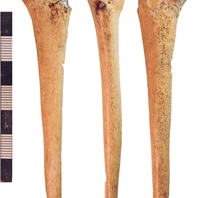
Viking Objects
Pin-Beater (NLM-78D3B5)
This pin-beater was made from a large mammal limb bone, trimmed to a rounded point and smoothed and glossed by wear and handling. Single-ended simple weaving tools are a class linked to the Anglo-Scandinavian use of the vertical loom.
